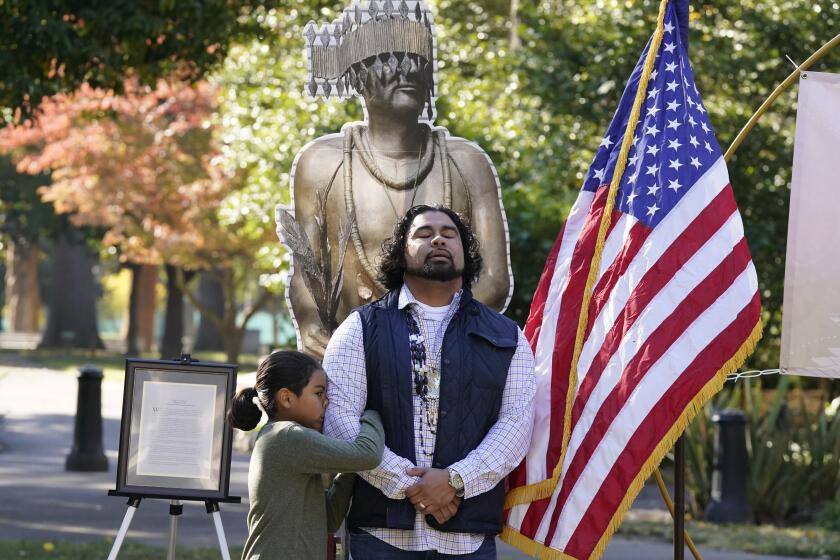20,000 Attend Anaheim Convention of Senior Citizens : Children Do Help Parents, Retired Told
The notion that elderly, ailing parents are forgotten or neglected by their adult children today--unlike the days when mom and dad typically moved into their children’s homes--is a myth, an authority on geriatrics told a national convention of senior citizens in Anaheim Tuesday.
“Children are stretching themselves, doing everything they can to take care of their parents,” said Elaine M. Brody, director of human services at the Philadelphia Geriatric Center. Parents are placed in nursing homes “only as a last resort,” and even then they are not abandoned, she added.
“Having a family is a pretty good insurance policy against going into a nursing home,” said Brody, addressing a session of the American Assn. of Retired Persons on the opening day of a three-day gathering at Anaheim Convention Center.
More than 20,000 people are attending the event, which also featured opening-day speeches by former U.S. Rep. Shirley Chisholm and psychologist Joyce Brothers and entertainment by George Burns. A fitness walk with former pro football player Rosey Grier and talks by astronomer Carl Sagan, Sen. Alan Cranston (D-Calif.), Arizona Gov. Bruce Babbitt, journalists Eric Sevareid and Geraldo Rivera and columnist Ann Landers are scheduled for today and Thursday.
Cyril Brickfield, AARP executive director, said a “goodly number” of the convention-goers are in their 30s and 40s, attending because of concern about Social Security benefits and to get information about health care and services for their elderly parents.
Brody said the issue of care for elderly parents is especially pressing today because the number of senior citizens is growing, thanks to medical advancements and better health care, while the proportionate number of children is declining, due to the falling birth rate.
Only 23% of all older people need help and of those, 80% to 90% are getting the necessary assistance from their grown children, Brody said. But that does not diminish the need for government aid to the elderly, she added.
While a senior citizen may not need help at age 65, as the person continues to grow older, he or she may no longer remain self-sufficient, she explained. Children will most likely step in, helping their parents maintain their own households or, when necessary, moving their mothers and fathers in with them, she said.
Children Need Help
However, grown children who care for their parents--often while holding down jobs--need assistance in the form of day care, visiting nurses, household maintenance and other support.
“The adult child cannot do it all and must have government help,” Brody said. That assistance “doesn’t discourage the children. The children will do what they can.”
There are exceptions, Brody added, and the stories of ungrateful and hard-hearted children keep certain myths alive. But while there are cases of neglect and even abuse of the elderly, the same can be said about younger generations’ cases of child neglect and abuse, she said.
Although they are willing to help their parents, the children often suffer under economic and emotional strain, she said. Such care is often demanding and unrelenting because elderly parents--who in earlier days died quickly of acute medical problems--now suffer from chronic ailments such as arthritis, Alzheimer’s disease and heart problems, she said.
Further, children should be prepared to deal with the same parent-child tensions that cropped up when the parents were heading the household, Brody said.
“Let’s not be foolishly romantic,” she said. “When people turn 65 they don’t suddenly become sweet little old ladies and charming old men.” If they are sweet and charming as senior citizens, it is a good bet they had the same personality when they were younger, too, she said.
Children Older, Too
Many of the children caring for elderly parents are in fact senior citizens themselves, Brody said. One-tenth of all people over 65 have children who also are over 65, she said to the nods of white- and gray-haired convention-goers, who later peppered her with questions about problems with their own parents.
But such statistics, turned upside down, reveal a wonderful picture for the younger generations, Brody said.
“At every age, beginning with birth, people now have more older relatives,” she said. It is not unusual for a child today to have great-grandparents, she said, adding, “that never happened in the good old days.”
There are other myths about caring for older parents, she said. First, she said, most elderly parents do not want to move into their children’s homes.
“They want the privacy and dignity of their own homes,” Brody said. In addition, the proportion of poor senior citizens had “dropped dramatically” through the years and “old people don’t want to take money from the children,” she said.
The popular misconception is that elderly parents are needy, but the giving flows downward, too, Brody said. Grandparents provide 17% of all child care and often help with grandchildren’s education expenses, she said. Many “empty nests” are being refilled by taking in grown daughters and sons and their children as a result of divorce or economic problems, she said.
In another session, psychologist Brothers challenged the convention-goers to stay mentally alert and independent by rejecting the myths that the elderly are “decrepit, ill and senile.
“Believing that will make you decrepit, old and senile,” she told a packed convention hall.
“Eat well, exercise, keep up with things and keep active. That is the recipe for old age,” she said. “Myths about aging will make you old before your time.”
Should Manage Stress
Brothers advised the senior citizens to learn to manage stress. Studies have shown that people who take steps to resolve problems, who feel a degree of control--even if the problem does not get solved--experience less stress than those who believe they are helpless victims, she said.
The death of a husband, for example, is no reason to retreat and wither, she told women in the audience.
“Many feel they’re being unfaithful if they enjoy life afterwards,” but the capacity to love is healthy and does not go away with a spouse’s death, she said, encouraging widows to join groups, travel and have fun.
“The more you love, the more you have a right to spill that on others. . . . It is a tribute to your husband,” she said.
Studies have shown that having a close friend, someone to confide in, can determine whether the golden years are happy or depressing, she said. “You need a friend to survive.”
In a world of miracle drugs, the best prescription for happy golden years is “the miracle of love,” Brothers said. “The days are more meaningful, food tastes better, you are more creative . . . when you’re loved.”
More to Read
Start your day right
Sign up for Essential California for news, features and recommendations from the L.A. Times and beyond in your inbox six days a week.
You may occasionally receive promotional content from the Los Angeles Times.






